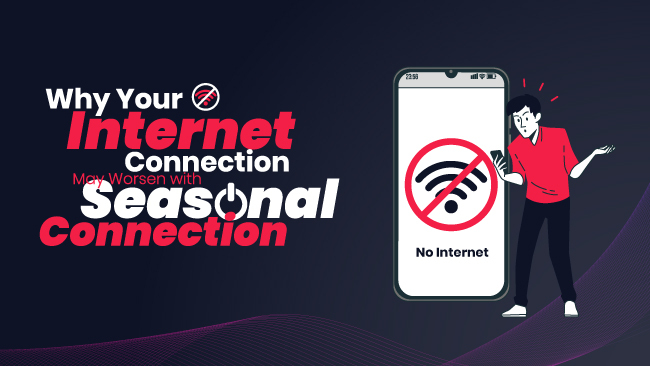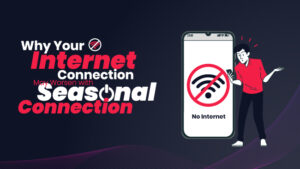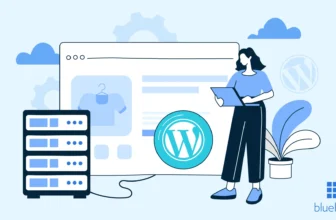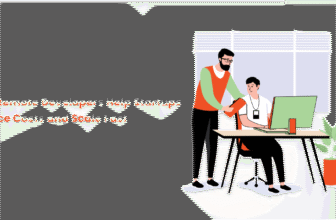

Whether you’re streaming the big game, enjoying a family movie night, or working from home, it can be incredibly frustrating when weather conditions make the internet disrupted. Depending on your connection type, various elements can lead to slower internet speeds or even complete outages. Here’s a closer look at how weather can affect your internet and some tips on how to fix bad internet connection.
Snowy and Icy Weather
While winter can create a picturesque landscape, snow, ice, and freezing temperatures can damage network equipment, leading to internet issues today and preventing the internet from reaching your home.
Impact on the Internet:
Facing “internet issues in my area?” When temperatures drop below freezing, traditional cables can become brittle and prone to breaking, leading to slower connections. Satellite dishes may collect snow, obstructing signals, while ice and freezing rain can coat cables and antennas, causing performance issues. Cold air can also scatter wireless signals, disrupting service. However, fiber optic internet is more resilient, only being affected by deep frost.
How to Prepare:
Investing in weather-resistant equipment from your internet service provider can help reduce winter weather challenges. Regular maintenance can prevent wear and tear on cables, and damaged lines should be replaced. For satellite internet, consider using a dish cover or heater to prevent snow accumulation.
Excessive Heat Weather
Just like any electrical device, exposure to extreme heat can temporarily degrade performance or cause permanent damage, so it’s important to be cautious with overheated equipment.
Impact on the Internet:
High temperatures can cause routers and modems to overheat, leading to connectivity issues or hardware failure. Intense sunlight may interfere with satellite signals, while heat waves increase internet usage, straining network resources. If you’re experiencing “internet issues today in my area,” data centers could also be affected. However, fiber optic lines are built to withstand extreme temperatures, making disruptions less likely.
How to Prepare:
Using heat-resistant equipment and optimized cooling systems can help maintain a stable connection during extreme heat. If your modem or router gets too hot, move it to a cooler location or shut it down to avoid permanent damage.
Heavy Rainfall & Stormy Weather
A typical rainstorm usually won’t affect your internet connection, especially if you have modern equipment. However, if your internet does slow down on rainy days, there are steps you can take to fix bad internet connection.
Impact on the Internet:
For most connection types, light rain doesn’t pose a problem. However, heavy rain can weaken satellite internet signals due to interference between the satellite and your dish. While DSL and cable connections are generally unaffected, radio transmissions can be interrupted under certain conditions. Fiber optic cables, which transmit data via light signals, are not impacted by rain.
How to Prepare:
Ensuring your equipment is up-to-date can help fix bad internet connection issues and minimize any impact rain might have on your connection. Modern networks are built to handle moderate rain without issues.
Hurricanes and Strong Winds
Severe storms or high winds can damage power lines, cables, and other internet infrastructure, leading to outages. Recovery may take time, so it’s important to have a backup plan.
Impact on the Internet:
High winds can get the internet disrupted by damaging overhead cables directly or by toppling trees and debris onto them, leading to extended outages. Strong winds may also misalign satellite dishes and damage fiber cables, slowing speeds. While backup power systems exist, they can fail, causing further disruptions after the storm.
How to Prepare:
Much of the preparation for severe storms rests with the internet service provider. Providers should ensure their infrastructure can withstand extreme conditions and have plans to restore service promptly if the weather gets the internet disrupted. Since power outages are common during such events, it’s wise to have alternative ways to monitor weather and evacuation orders, such as battery-operated radios.
Build a Strong Digital Defense
If you’re tired of internet issues today or whenever the weather changes, fiber internet might be the solution you need. Unlike cable, which can be affected by electrical signals during storms, fiber internet uses light signals that are reliable in nearly all weather conditions.
Check out the deals and plans on Cables Finder Internet to find the best options for enhancing your online experience, no matter the weather.







